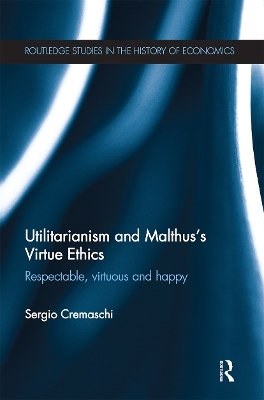
Utilitarianism and Malthus' Virtue Ethics
Respectable, Virtuous and Happy
Seiten
2020
Routledge (Verlag)
978-0-367-66949-2 (ISBN)
Routledge (Verlag)
978-0-367-66949-2 (ISBN)
The die-hard image of Malthus the ogre has not completely disappeared yet. And yet, Malthus showed no less concern than Adam Smith for the labouring poor. In order to make full sense of such expression of concern and to appraise their relevance in Malthus’s work, we need to know what moral philosophy, what view of natural science, and what view of the "moral and political science" Malthus endorsed.
This book reconstructs Malthus’s meta-ethics, his normative ethics and his applied ethics on such topics as population, poverty, sexuality and war and slavery. They show how Malthus’s understanding of his own population theory and political economy was that of sub-disciplines of moral and political philosophy. Empirical enquiries required in order to be able to pronounce justified value judgments on such matters as the Poor Laws. But Malthus’s population theory and political economy were no value-free science and his non-utilitarian policy advice resulted from his overall system of ideas and was explicitly based on a set of familiar moral assumptions.
It is mistaken to claim that Malthus’s explanation of disharmony by reference to Divine Wisdom is extraneous to analysis and without influence on the theory of policy; it is true instead that theological consequentialist considerations were appealed to in order to provide a justification for received moral rules, but these were meant to justify a rather traditional normative ethics, quite far from Benthamite ‘new morality’.
This book reconstructs Malthus’s meta-ethics, his normative ethics and his applied ethics on such topics as population, poverty, sexuality and war and slavery. They show how Malthus’s understanding of his own population theory and political economy was that of sub-disciplines of moral and political philosophy. Empirical enquiries required in order to be able to pronounce justified value judgments on such matters as the Poor Laws. But Malthus’s population theory and political economy were no value-free science and his non-utilitarian policy advice resulted from his overall system of ideas and was explicitly based on a set of familiar moral assumptions.
It is mistaken to claim that Malthus’s explanation of disharmony by reference to Divine Wisdom is extraneous to analysis and without influence on the theory of policy; it is true instead that theological consequentialist considerations were appealed to in order to provide a justification for received moral rules, but these were meant to justify a rather traditional normative ethics, quite far from Benthamite ‘new morality’.
Sergio Cremaschi is a Professor of Moral Philosophy at the Department of Humanities, Amedeo Avogadro University of Eastern Piedmont, Italy
1. Malthus the Utilitarian vs. Malthus the Christian moral thinker 2. Eighteenth-century Anglican ethics 3. Malthus’s meta-ethics 4. Malthus’s early normative ethics: a morality of freedom 5. Malthus’s intermediate normative ethics: a morality of prudence 6. Malthus’s mature normative ethics: a morality of humanity 7. Malthus’s applied ethics 8. Conclusions: strengthening the theological foundation
| Erscheinungsdatum | 01.10.2020 |
|---|---|
| Reihe/Serie | Routledge Studies in the History of Economics |
| Verlagsort | London |
| Sprache | englisch |
| Maße | 156 x 234 mm |
| Gewicht | 453 g |
| Themenwelt | Geschichte ► Allgemeine Geschichte ► Neuzeit (bis 1918) |
| Geschichte ► Teilgebiete der Geschichte ► Wirtschaftsgeschichte | |
| Geisteswissenschaften ► Philosophie ► Geschichte der Philosophie | |
| Geisteswissenschaften ► Philosophie ► Philosophie der Neuzeit | |
| Sozialwissenschaften ► Soziologie ► Allgemeines / Lexika | |
| Wirtschaft ► Allgemeines / Lexika | |
| Wirtschaft ► Volkswirtschaftslehre | |
| ISBN-10 | 0-367-66949-8 / 0367669498 |
| ISBN-13 | 978-0-367-66949-2 / 9780367669492 |
| Zustand | Neuware |
| Informationen gemäß Produktsicherheitsverordnung (GPSR) | |
| Haben Sie eine Frage zum Produkt? |
Mehr entdecken
aus dem Bereich
aus dem Bereich
Giordano Bruno - ein ketzerisches Leben
Buch | Hardcover (2024)
C.H.Beck (Verlag)
29,90 €
das dramatische 16. Jahrhundert
Buch | Hardcover (2024)
Rowohlt Berlin (Verlag)
34,00 €


